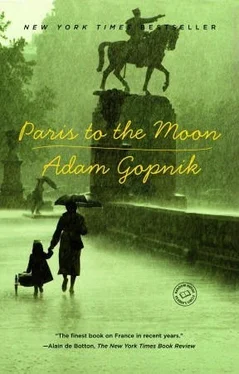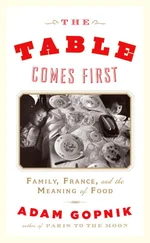Then something really nice, genuinely terrific happened. Earlier that year, at the school he went to at the American Church, he had fallen in love. The little girl was named Cressida Taylor. She was the dish, the girl he had said was “quite a dish.” (I had finally tracked the expression down to a three-hour compilation of Warner Brothers’ Looney Tunes from the forties that we had bought for him. Bugs Bunny says it about, well, about a dish.) I met her at the school, and she was quite a dish, the most beautiful five-year-old girl I have ever seen. She had fair skin, and high blue eyes, and two long golden braids of hair, mermaid tresses, really, and an Audrey Hepburn voice, that elegant, piping voice of children who have been raised in both French and English. (Her mother was a sensible Englishwoman, and her father, I think, some kind of French banker.)
Unquestionably a dish, she was also a peach. It had been Cressida who had finally gotten Luke past the nap crisis at school, generously holding his hand when the teachers would insist that the children “take a rest” and he would go into a panic. She had come over to play a few times. (No one used the expression play date in Paris. Kids just came over, played, and then their mothers picked them up and took them home.) They played intensely, and there was, I thought, fondly, a kind of Gilberte and Marcel quality to their playing. They just played, you see, and all the other things that pass between boys and girls just passed, without comment or too much oversight from their parents. Martha was relieved at least. In love with her son, she was already worried about the woman who would take him away, and I think that she would have betrothed them on the spot, like seventeenth-century royalty, if she could have. But Cressida had left his school, and now we saw her, wistfully, only every now and again.
On that memorable Wednesday afternoon Luke and I went to the pool. Though he liked to swim, he went, to my puzzlement, mostly to take home the little shower caps that were placed all around the locker rooms. They were just shower caps, but they came in blue cardboard boxes, with the Ritz coat of arms printed in gold on them, and he would sneak home ten or eleven at a time, tucking them under his arms, hiding them in the pockets of his white terry-cloth peignoir, and then sticking them in his jacket—why and to what end, I was never sure.
We were strangers at the Ritz. I was nervous, self-conscious about seeming too loud or too American. “Lets kiss the mermaids,” Luke would insist, every time we went swimming, and though they were scarcely five feet down, within easy dive-and-kiss distance, I never could. I was too self-conscious about splashing a lot on my way down, my flattish feet waving, and about what the ladies with the tall hair would think about it. Luke couldn’t do it either, since five feet was still far too deep for him to go, but he tried, manfully, and didn’t care if he splashed or not.
On this Wednesday, though, after the furtive theft of a few shower caps, and the endless irritating “Please stand still!” of a father changing a kid into his swim trunks, we got to the pool. Normally he couldn’t wait to jump in, but now he stood utterly still at the edge of the water. I saw his small, skinny body in the madras trunks stiffen, and then he got a shy, embarrassed smile on his face and backed away.
“Daddy, look,” he whispered.
“What?” I said.
“Daddy, look,” he repeated urgently, still under his breath. “It’s Cressida.”
It was too. And the most beautiful thing I had ever seen, right there in the middle of the Paris Ritz pool. She was floating as elegantly as an angel, just above the mermaids, a little on her side, her long blond braids trailing in the water behind her. I think my heart stopped a little bit at that moment too.
Luke’s certainly had stopped and then restarted. He leaped right in, before I could stop him, and head up—like a puppy, like a millionaire’s wife—he swam out to his love in the water.
Cressida, it turned out, after a few minutes of splashing, happy greeting, was there with her best friend and constant companion Ada. (The year before, Luke had complained to me about how inseparable they were: “It’s like they’re twins or something.”) Ada turned out to be a startling, perfect, central casting best friend, with a throaty, husky Glynis Johns-Demi Moore voice, the perfect sultry sidekick to perfect radiant beauty. They both were there with Cressida’s nanny, a jolly Australian girl named Shari, who played the trombone, and whom I can describe only by saying that she looked like a jolly Australian girl who played the trombone.
The two little girls were excellent swimmers, veterans of the Ritz pool, I supposed. They splashed back and forth easily, and Luke manfully struggled after them, head up, losing it, swallowing water and coming up exhausted and clinging to the side and spitting out, his face scrunched up in misery, but then shaking his head violently (“I’m fine! I’m fine!”) when I came up and, a little too paternal, a little too obvious, pounded him on the back and asked him if he was OK. Then he shot back out to the girls in the middle of the pool. Pretty quickly he worked out a good method of getting around; first clinging to the side of the pool, then shooting out in backstroke, and then going into a quick three-stroke combined breaststroke-doggy paddle over to the girls—a wonderful simulacrum of a guy who is just an easy, varied swimmer. (He swam, I realized, exactly the way that after five years I spoke French, which also involved a lot of clinging to the side of the pool and sudden bravura dashes out to the deep end to impress the girls, or listeners.)
I hovered around him, worried—I was snob enough to be tickled that he had learned to swim at the Ritz pool in Paris but insecure enough to worry about what his mother would say if I lost him at the Ritz pool; after all, it was, at its deep end, effectively as deep as the ocean, three times over the head of a small boy—only to have him shake me off, again and again.
I didn’t mind, really I have never seen a human being before in a state of pure liquid unadulterated joy. The little girls, to my surprise, for I had had more bitter experiences at his age, seemed to accept him absolutely as an equal and fellow diver and Ritz habitue, a bee-fin of this damp beau monde, albeit one with a bit of water in his lungs from time to time. And if his lungs were filling up with water, swallow by swallow, he didn’t care. He just followed the red bathing suit and the blond braid, wherever they led him.
The Australian au pair and I huddled around the edges of the pool and made conversation. She had been in Paris for only a couple of weeks, she explained, had flown right over from Sydney. She seemed unperturbed, not even much interested in her surroundings, Australians being like that, I suppose: From the Sydney beach to the Ritz pool, all just water, isn’t it?
After about half an hour Ada paddled over. “I want a chocolat chaud,” she said, imperiously. She looked at me just the way that Lorelei Lee must have looked at her sugar daddy at the Paris Ritz, so I gathered up the children—Luke could barely speak, he was so filled with water—and we went up to the café on the terrace overlooking the pool. I strode up as boldly as I could manage to the white-shirted attendant behind the counter and ordered three hot chocolates and three cakes for the children and then a café creme for me and a Badoit for the Australian girl. I shuddered inside, imagining what it was all going to cost. As I say, I am hedonistic but not heedless, and like Luke, only with less fortitude, I knew that I was out of my depth and swallowing water.
Читать дальше












